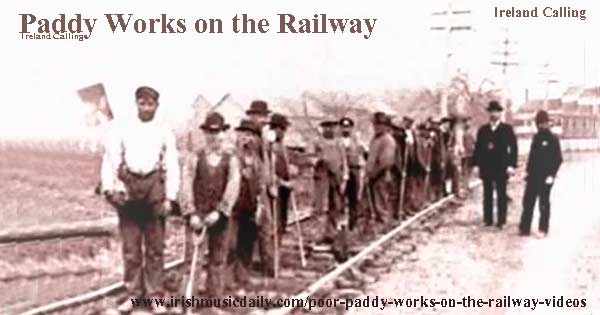Poor Paddy Works on the Railway was originally a sea shanty.

It made its way on to land in the middle of the 19th century when gangs of Irish labourers were employed to build the emerging rail networks in Britain and the United States.
Dubliners and Pogues add extra refrain
Poor Paddy Works on the Railway Videos
Lyrics and Chords
It’s easy to see why the song made the transition. Sea shanties were sung by sailors performing hard tasks in harsh conditions while isolated from their families; the rail workers‘lot was much the same – living in camps and following the route on the rail lines they were building.

Broadcaster David Frost once joked that the British owed their roads to two great nations: the Romans and the Irish. He might also have credited the Irish with building Britain’s railways and canals.
The thousands of Irish labourers employed building Britain’s rail and canal network were known as navigators, which became shortened to navvies – a name that was to be associated with Irish workers for more than a hundred years.
In the mid 19th century, famine torn Ireland was a rich source of young men looking for work. Thousands jumped at the chance to earn a living as a rail worker. They had to be tough and they carried out their crippling work on a diet made up largely of bread, meat and beer.
The Irish worked on every major railway, road and canal in the UK. It was a similar story in the US.
‘Paddy’ refers to Irish workers in general
Poor Paddy Works on the Railway follows a simple, repetitive structure telling the story of one or possibly several navvies between 1841 and 1848. Paddy here refers to Irish workers in general rather than any one individual.
In 1841, Paddy puts his corduroy britches on and gets to work. In 1842 we learn he didn’t “know what to do” to work on the railway. In subsequent verses he sails across the sea, he lands in Columbia and later he changes his trade to carrying bricks.
In the fifth verse, there’s a random reference to Daniel O’Connell being alive in 1845. O’Connell was an Irish politician and nationalist campaigner. He was known as the liberator. He was a major figure in Irish history but had no significant connection with railways or their employees.
The reference to O’Connell tells us very little except that the song isn’t so much relating a story as laying down specific and sometimes random thoughts– a characteristic of many songs in the shanty tradition.
The genuine feeling that does come across quite clearly, however, is that Paddy is weary of working on the railway. This thought is repeated in the refrain at the end of each verse. The weariness is hardly surprising as it was soul-destroying work and the mortality rate was high. The Dubliners and The Pogues add an extra refrain
Poor Paddy Works on the Railway
Dubliners and Pogues add extra refrain
Poor Paddy Works on the Railway Videos
Lyrics and Chords

